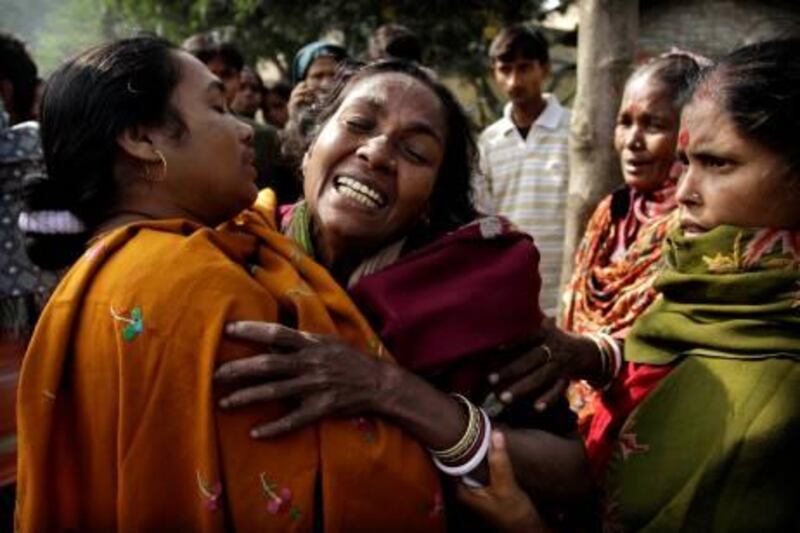NEW DELHI // More than 140 people, including teenage boys, have died after drinking bootleg liquor in India. Hundreds more are in hospital and the death toll is expected to rise, police said yesterday.
The victims from four villages near the town of Sangrampur, about 50 kilometres south of the West Bengal capital of Kolkata, had been drinking a local liquor known as "cholal".
It normally contains ingredients such as battery acid and methyl alcohol, a chemical solvent used as furniture polish, that adds potency to the drink but leads to dizziness, vomiting, and in extreme cases, blindness or death.
The brew is sold in unlicensed stores all over India and remains popular, despite the danger, because it is cheaper than licensed liquor.
Customers are normally poor - daily labourers, rickshaw drivers, and semi-skilled workers such as leather-cutters who may earn as little as 250 rupees (Dh17) a day. A 200 millilitre bottle of cholal costs about 10 rupees, less than a third the price of legal alcohol.About 350 have been hospitalised. The dead include boys aged between 10 and 15.
Angry residents ransacked a local illegal brewery yesterday.
Shankar Mahto, a construction worker, is one of those who died. He leaves a wife and three children.
Yesterday morning, he complained of a loss of vision after drinking the night before. By the time his wife, Kanakshidu, took him to hospital, he was dead.
Villagers complained about the lack of hospital space and medical attention, as patients were laid in makeshift stretchers in corridors, waiting for basic treatment.
Anwar Hassan Mullah brought six victims to a hospital. All died.
He told a television news channel police turned a blind eye to bootleggers.
"It's a very sad thing that this has happened," Mr Mullah said.
"Why don't the police stop this? I cannot understand. What connection do they have" to the bootleggers?
Police were still searching for Noor Islam Fakir, the man who allegedly supplied the adulterated batch. Another seven people have been arrested in connection with the sale of the liquor.
Mamata Banerjee, West Bengal's chief minister, has ordered an investigation and announced that 200,000 Indian rupees (Dh13,700) will be paid in compensation to each family.
"I want to take strong action against those manufacturing and selling illegal liquor," the Press Trust of India quoted Ms Banerjee saying. Ms Banerjee is also the state health minister.
The deaths comes less than a week after a hospital fire killed 93 people in West Bengal. Both disasters highlight lax health and safety standards and the sagging infrastructure in a nation of 1.3 billion people.
Every year, hundreds die from drinking homemade liquor all across the country, often at wedding parties, although rarely in such numbers in one incident.
In 2009, more than 157 people died in the state of Gujarat and 180 people died in 2008 around the city of Bangalore.
[ sbhattacharya@thenational.ae ]
With additional reporting by the Associated Press





